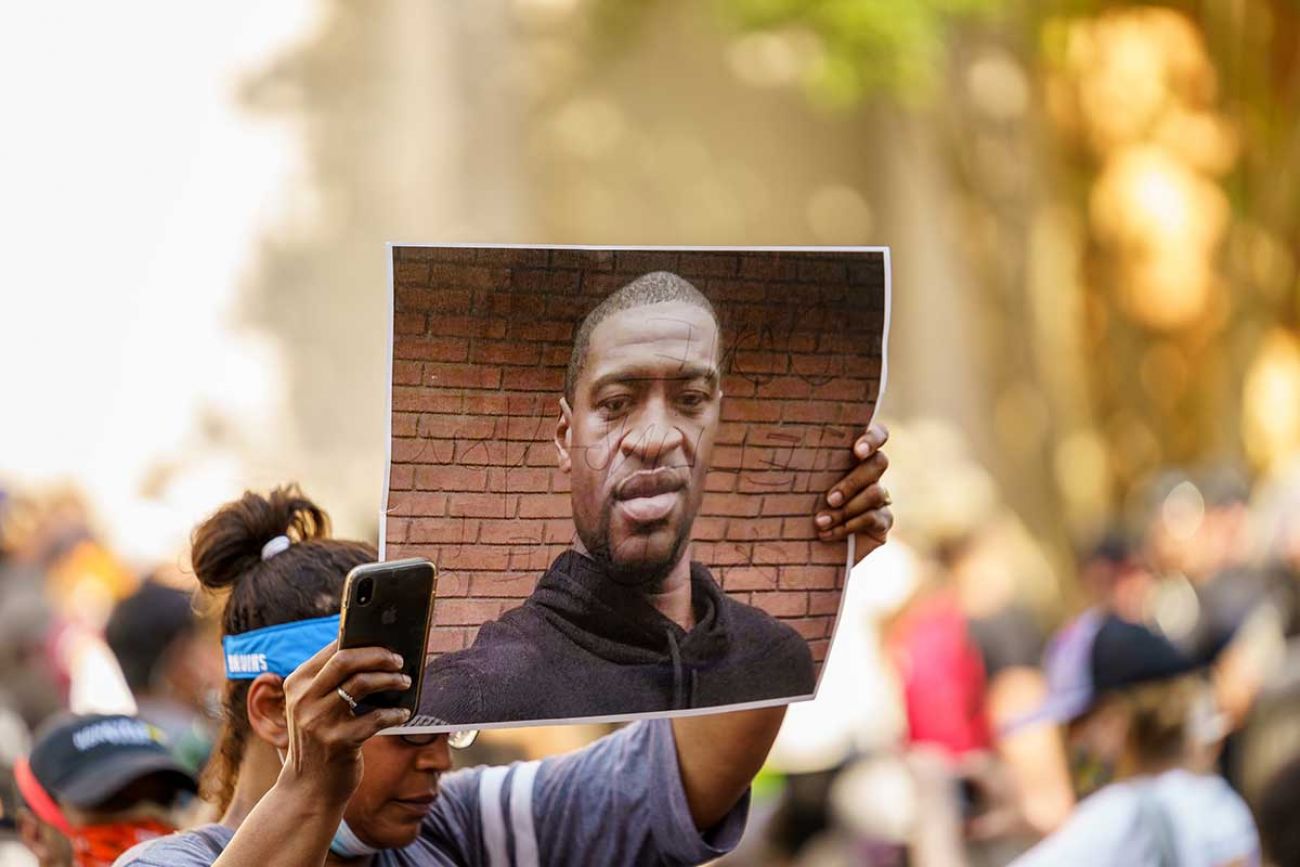One year after George Floyd murder, lawmakers propose Michigan police reforms

LANSING — Michigan would set standards for the use of deadly force by police, create a uniform system for independent investigations of officer-involved shootings and limit no-knock warrants under a reform proposal introduced Tuesday in the state Senate.
Michigan has not enacted any legislative reforms in the year since a Minneapolis police officer murdered George Floyd, an unarmed Black man, sparking national protests and a renewed debate over measures to reduce the potential impact of systemic racism.
The new 12-bill package may have better odds of becoming law: It's bipartisan, developed through months of work by lawmakers, including Republican Senate Judiciary Committee Chair Roger Victory of Hudsonville and ranking Democratic Sen. Stephanie Chang of Detroit.
Related:
"Unfortunately we can't bring George Floyd back," Chang told Bridge Michigan on Tuesday, the anniversary of his death.
"We can't bring back Breonna Taylor. We can't bring these individuals that we've lost to police violence, but we can make changes that could prevent those tragedies from happening."
Among the bills, Senate Republicans are lead sponsors on proposals that would ban police officers from using chokeholds, except to save a life, and would establish a clear and legal "duty to intervene" for officers that witness colleagues abusing their authority.
Democratic-sponsored measures would ban the use of "no-knock" warrants, except in certain circumstances, and require the state to set new standards for training officers in de-escalation techniques and ways to avoid implicit bias.
Chang proposed legislation that would require agencies to have a written "use of force" policies that outline a continuum of possible police responses. Officers would need to provide a verbal warning before shooting at someone and exhaust alternatives before reaching that point.
Victory sponsored a measure that would require the Michigan Commission on Law Enforcement Standards to develop guidelines for independent investigations of police-related deaths and require each agency to develop a public policy that meets those guidelines.
“This is an opportunity for us to unite to protect all Michiganders with proactive measures that will put in place the best practices from law enforcement agencies across our state,” Victory, R-Hudsonville, said in a statement.
Law enforcement associations opposed prior reform proposals and claim that anti-police sentiment is making it difficult for them to hire officers.
“We don’t need legislation to tell us to do what we already do,” Robert Stevenson, executive director of the Michigan Association of Chiefs of Police, said during last year’s legislative debate.
Victory and Chang said they incorporated feedback from the law enforcement community into the new package, which would also mandate a state study on police recruitment and retention.
"We all have the shared goals of improving policing, community interactions and public perceptions while supporting the many courageous police officers who keep our families safe," Victory said.
As Bridge reported last month, the Michigan Legislature has not sent Gov. Gretchen Whitmer any significant police reform legislation since Floyd's death on May 25, 2020.
Bills to ban police chokeholds went nowhere last year. So did a measure to mandate police intervene if they witness misconduct by fellow officers, even though it was co-sponsored by Senate Majority Leader Mike Shirkey.
Both chambers unanimously approved separate bills to require new officers to de-escalate confrontations and recognize their own implicit biases, but neither chamber approved the other’s proposal, so the legislation did not make it to Whitmer's desk by the end of the term.
Chang told Bridge Michigan that Democrats and Republicans were already working to craft a larger, bipartisan plan last year when some of those bills were introduced.
She and Victory, who took over the Judiciary Committee in January, engaged police groups, local activists and national advocacy organizations as they developed the new package, Chang said.
"These bills are the result of that work, and I really believe they would go a long way to address some of the very basic principles around accountability and transparency and use-of-force policies," she said.
"I'm hopeful that we can get this done, and I'm really proud it is a solid bipartisan package. Sen. Victory has been really great to work with."
Committee hearings should start soon in the Senate, but It's not yet clear whether House Republicans would support the legislation if it reaches them.
House Speaker Jason Wentworth’s office did not immediately respond to a request for comment.
Wentworth, a Farwell Republican who served as a military police officer, this month unveiled a separate $80 million spending proposal to help police recruit or retain officers and overcome what he called an “insane” public backlash.
"This profession has been beaten down in the media, and by politicians," Wentworth said on May 13. "We are focused solely right now on supporting our men and women in uniform."
Michigan’s inaction on police reforms have made it an outlier: As of last month, more than 30 states have passed more than 140 new police oversight and reform laws since Floyd’s murder, according to a New York Times analysis.
In the absence of statewide reforms, including inaction on proposals by Whitmer, some local agencies have enacted their own reforms.
The Detroit Board of Police Commissioners in August banned chokeholds and required officers to intervene when a colleague uses excessive force, among other things.
The Saginaw Police Department announced a similar policy in June, including a “use of force continuum” that defines actions officers must take before using lethal force.
Chang's bill would define that use of force continuum on a statewide level, standardizing what she said are often "inconsistent" local policies to spell out when deadly force is appropriate and make sure alternatives are considered first.
"It's pretty common sense, honestly," she said. "We have to try to prevent these situations from occurring -- excessive force incidents or officer-involved shootings — and one of the best ways we can do that is by having really clear and consistent policies across the state."
See what new members are saying about why they donated to Bridge Michigan:
- “In order for this information to be accurate and unbiased it must be underwritten by its readers, not by special interests.” - Larry S.
- “Not many other media sources report on the topics Bridge does.” - Susan B.
- “Your journalism is outstanding and rare these days.” - Mark S.
If you want to ensure the future of nonpartisan, nonprofit Michigan journalism, please become a member today. You, too, will be asked why you donated and maybe we'll feature your quote next time!




